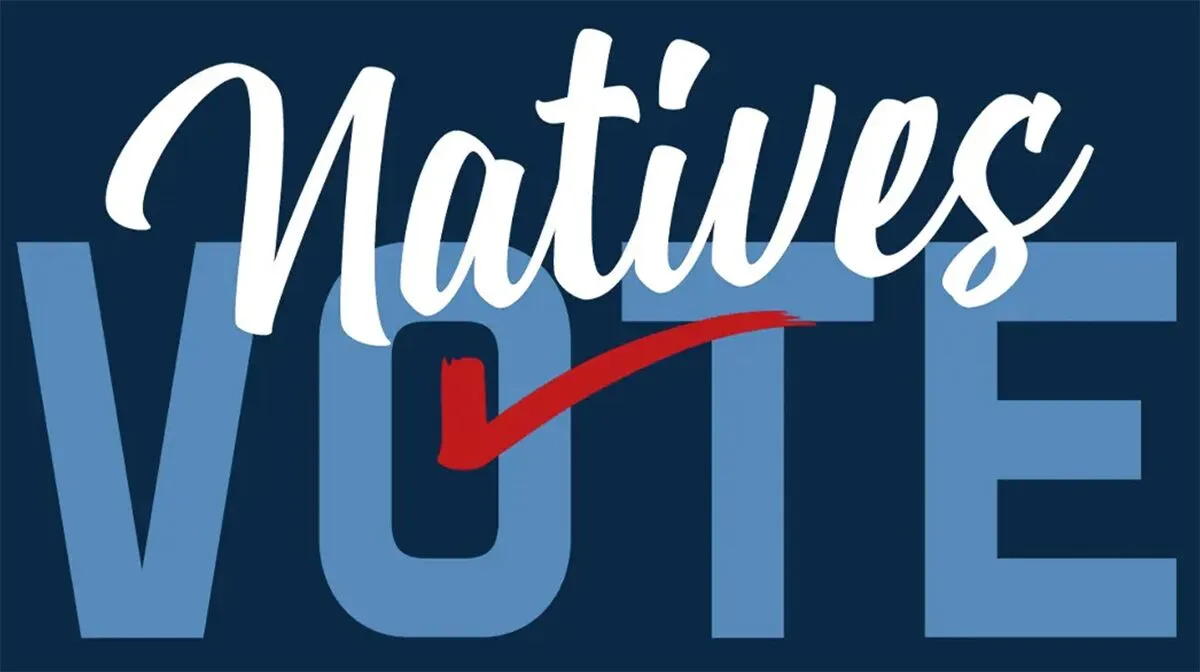
- Details
- By Neely Bardwell
Native Vote 2024. With just six weeks to go before Election Day, Advance Political Leadership Action Fund (Advance), the first and only national Native-led organization working to build a complete ecosystem approach to political power building in Native communities, announced its first-ever endorsement of any non-Indigenous candidate for office.
Anathea Chino (Acoma Pueblo), Co-Founder and Executive Director of Advance, says the Harris-Walz ticket is committed to Indian Country. Advance Political Leadership Action Fund is the organization's 501(c)4 project helping to elect Native leaders at all levels of public office.
“While this isn’t the first time a national ticket has shown an understanding of and commitment to Native peoples, this moment represents a historic shift with a deeper investment in elevating Native leaders and communities,,” said Chino. “Gov. Walz’s partnership with Lt. Governor Peggy Flanagan and legislative record in Minnesota is proof he is committed to the unique status of Tribal Nations and our right to existence, self-governance, and self-determination. His inclusion on the presidential ticket is a game changer.”
Minnesota Governor Tim Walz and Lieutenant Governor Peggy Flanagan (White Earth Ojibwe) were the first state executive leaders to visit all eleven tribes located in Minnesota. Since their election in 2018, Walz and Flanagan, a co-founder of Advance, have established a significant legislative record of greater opportunities and support for Native communities, including requiring state agencies to create and implement tribal consultation policies and requiring agencies to appoint tribal-state liaisons and mandating state agency leaders and employees to attend tribal-state relations training.
Following a longstanding conversation surrounding the Minnesota state flag and seal that had racist Native imagery, Walz and Flanagan changed the flag and included the Dakota name for the state, "Mni Sota Makoce” on it. They also saw the return of Upper Sioux State park to the Sioux community.
This election season, the Native vote could be the deciding factor in a Harris-Walz victory in several key battleground states, including Arizona, Michigan, Nevada, and Wisconsin. In 2020, Native American voters helped elect President Biden in each of these states, demonstrating the impact that Native voters can have in very tight races where their population is greater than the margin of victory.
So far this year, Advance has endorsed 42 Native leaders running for federal, state, and local offices across 13 states in 2024, representing its largest endorsement slate ever. This election season, Native Americans, Alaska Natives, and Native Hawaiians are making history like never before with 226 candidates running in 25 states. While 348 Native Americans currently hold elected office in the United States, more than 17,000 are needed to reach representational parity in elected office based on population.
“This is a historic opportunity for Native peoples to participate in an election that can bring about a better Indigenous future, one that offers greater opportunities, visibility, and support for Native communities. A vote for Kamala Harris and Tim Walz is a vote for Peggy Flanagan to become the nation’s first Native woman governor, which could set a powerful precedent for Native representation in Minnesota and across the country. Her leadership would further elevate the concerns of Native communities, creating more opportunities for Indigenous voices to influence policy at the highest levels,” says Chino. “It is proof that inviting movement leaders and activists from all walks of life into the halls of power to develop shared strategy ensures we all win together.”
More Stories Like This
Native News Weekly (August 25, 2024): D.C. BriefsUS Presidents in Their Own Words Concerning American Indians
Indigenous Actor Elaine Miles Reports Detention by Alleged ICE Agents
Happy Thanksgiving from Native News Online
Coming Up on Native Bidaské: Behind the Animation: Joey Clift Talks “Pow” and Native Storytelling
Help us tell the stories that could save Native languages and food traditions
At a critical moment for Indian Country, Native News Online is embarking on our most ambitious reporting project yet: "Cultivating Culture," a three-year investigation into two forces shaping Native community survival—food sovereignty and language revitalization.
The devastating impact of COVID-19 accelerated the loss of Native elders and with them, irreplaceable cultural knowledge. Yet across tribal communities, innovative leaders are fighting back, reclaiming traditional food systems and breathing new life into Native languages. These aren't just cultural preservation efforts—they're powerful pathways to community health, healing, and resilience.
Our dedicated reporting team will spend three years documenting these stories through on-the-ground reporting in 18 tribal communities, producing over 200 in-depth stories, 18 podcast episodes, and multimedia content that amplifies Indigenous voices. We'll show policymakers, funders, and allies how cultural restoration directly impacts physical and mental wellness while celebrating successful models of sovereignty and self-determination.
This isn't corporate media parachuting into Indian Country for a quick story. This is sustained, relationship-based journalism by Native reporters who understand these communities. It's "Warrior Journalism"—fearless reporting that serves the 5.5 million readers who depend on us for news that mainstream media often ignores.
We need your help right now. While we've secured partial funding, we're still $450,000 short of our three-year budget. Our immediate goal is $25,000 this month to keep this critical work moving forward—funding reporter salaries, travel to remote communities, photography, and the deep reporting these stories deserve.
Every dollar directly supports Indigenous journalists telling Indigenous stories. Whether it's $5 or $50, your contribution ensures these vital narratives of resilience, innovation, and hope don't disappear into silence.
 The stakes couldn't be higher. Native languages are being lost at an alarming rate. Food insecurity plagues many tribal communities. But solutions are emerging, and these stories need to be told.
The stakes couldn't be higher. Native languages are being lost at an alarming rate. Food insecurity plagues many tribal communities. But solutions are emerging, and these stories need to be told.
Support independent Native journalism. Fund the stories that matter.
Levi Rickert (Potawatomi), Editor & Publisher

